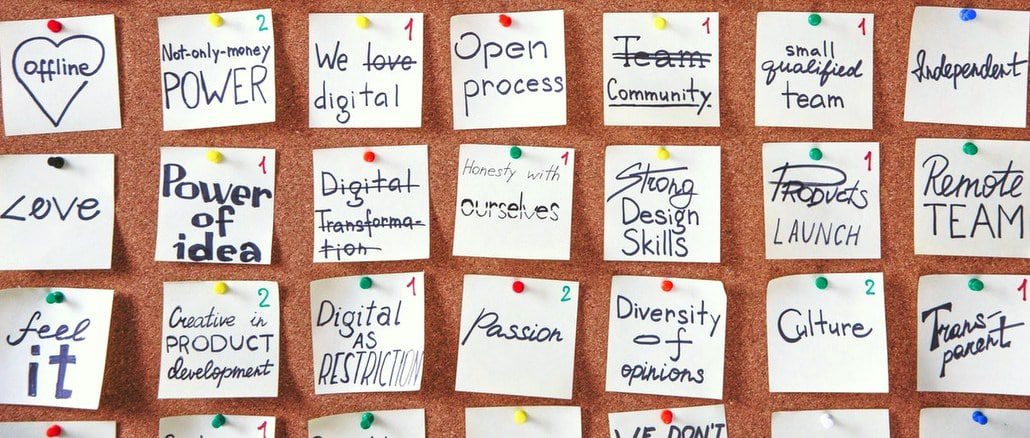
Association professionals, what’s the best advice you’ve heard about how to develop and deliver great instructional programs? As an extended enterprise education consultant, I’ve heard some fantastic ideas over the years – especially from learning practitioners and innovators who talk with me on The Talented Learning Show podcast.
At the end of these interviews, I always ask the same basic question: “What would you tell others who want to build a successful learning program?”
Recently when looking back at some responses, I realized that they deserve a special space on this blog. So I organized all answers into six categories:
- Extended Enterprise Learning
- Customer Education
- Partner Training
- Non-Profit and Association Member Education
- Commercial Training and Certification
- Learning Strategy and Technology
This is the second post in a series that showcases the full collection of “best advice” answers. In the inaugural post, we focused on channel and partner education. Today, we feature ideas for non-profit and association leaders.
“Best Advice” for Association Learning Program Success
From Episode 10:
How Does Collaborative Leadership Development Transform Consulting Services?
Q: What would you tell other non-profit organizations that are getting started with similar learning programs?
A: Meera Chary, Partner at The Bridgespan Group, a nonprofit consulting firm
At the outset, we were lucky to receive some great advice. We were told that simply putting our existing content online wouldn’t result in a strong digital learning experience. Instead, we were encouraged to think about the challenge we wanted to address, rather than specifying a particular product we had in mind.
That approach led us down a much different path than we expected. And now we’ve created something quite unique and powerful.
So that’s my recommendation for others. Start by clarifying your objectives. What exactly do you want to accomplish by converting your knowledge – your IP – into a digital experience? Think carefully about audience needs, abilities and expectations. Then consider how the sum of your assets can help you respond to those challenges.
From Episode 7:
How Are Associations Modernizing Certification Programs?
Q: Today’s continuing education market is defined by competitive pressure from all kinds of organizations. Where should associations focus?
A: Arleen Thomas, Managing Director, CGMA Exams & Global Offerings at AICPA
Often, association leaders tend to believe that because we have so much experience, we’re already experts in everything. But the days of sitting back and saying, “I know it all,” are gone.
We need to change that mindset and get closer to our customers. Their business objectives and dynamics are shifting very fast, so we should anticipate those shifts almost before they do. A customer-driven mindset is the best way to achieve that.
From Episode 11:
How Are Associations Preparing for the Future?
Q: What’s your best advice for associations that are trying to figure out how to modernize their learning programs?
A: Tamer Ali, SVP Education at Crowd Wisdom by Community Brands
Take a look back at your mission and vision statement. This will remind you of your roots. Are you still fulfilling that agenda? How can you simplify your strategy, programs and systems to fulfill that purpose in the new world order?
This is especially important if you’re competing directly with for-profit companies, which many esteemed associations do. They’re being challenged in the marketplace by agile startups that don’t have to worry about brand preservation. So why even try to compete with them head-on?
Instead, consider how you can work with these new entrants. Look for ways to leverage your strengths – which likely include the value of trust, a vetted community of practitioners and an industry perspective that comes from decades of involvement with that community.
Alliances may seem like a dangerous proposition. But you can minimize the risk if you understand the value of your assets and claim a niche that you can naturally occupy. Focus on what you do well. Over the long-term, success will come from this kind of focus and discipline, rather than assuming you have to turn everything on its head in reaction to external factors.
I’m not recommending that associations rest on their laurels or retreat to the past. I’m not saying associations must continue to produce live events or printed journals. But for some organizations, total upheaval is creating more problems than it’s solving. There is a happy medium, and it’s worthwhile for organizations to find that.
From Episode 12:
How Does Social Learning Improve Infant Healthcare?
Q: You’ve learned a lot from your pioneering approach to collaborative medical education. What would you say to others who want to follow in your footsteps?
A: Denise Zayack, Collaboratives Coordinator and Coach, Vermont Oxford Network
As you design and develop a solution, it’s important to include all relevant perspectives. I bring knowledge about clinicians and how teams work in a healthcare environment, while John has expertise in the learning process and related technology. If we weren’t working together as partners, this program would definitely miss the mark.
A: John McGregor, Learning Systems Manager, Vermont Oxford Network
Yes. Also it’s vital to talk with users so you can understand and verify their needs. You don’t want to build something that’s really cool but totally misses the mark.
We actually learned that lesson first-hand. At the start, we thought we knew what users needed in a digital learning experience. But ongoing communication revealed that some of those assumptions were wrong.
This taught us that the best thing you can do is set a good example of what it means to be a strong learner by listening carefully to people who are involved with your programs. Make learners an active part of your development and improvement process, and you’ll get better results.
From Episode 14:
How Can Nonprofits Educate Members and Volunteers at a Distance?
Q: After years in the non-profit world, what’s your advice for others who want to create an effective educational environment for a diverse community of volunteers?
A: Mary Burke, Associate Director of Educational Services at the Land Trust Alliance
Priorities obviously matter for content, technology and process management, because you don’t want to squander your time and resources. Also, you need to be sure members get access to exactly what they need whenever they need it.
It’s also important to connect with people on a human level. I rely on humor when connecting with others, because people tend to be more engaged when they’re having fun, no matter what they’re doing.
Plus, if people feel connected with you, they’re much more likely to be responsive and helpful when you ask them to sign-up for a task or complete something they’ve agreed to do.
From Episode 21:
What’s the Best Way to Choose Association Software?
Q: When considering new software, what should organizations keep in mind?
A: Chad Stewart, Founder and Chief Software Adviser, SmartThoughts
People often forget that the biggest cost of technology is not its price. It’s when technology doesn’t work.
So when you think about buying a system, don’t just think about your budget. If a solution won’t help solve your problem, there’s no reason to spend even a single penny on it.
Also remember that your expectations determine your happiness. So you’ll want to start with a clear idea of what’s important. What do you want technology to help you accomplish? Use that compass to stay on-course throughout the software search process.
We’ve all heard countless horror stories about unsuccessful systems. But when things go wrong, it usually started with a selection process that wasn’t handled correctly.
From Episode 22:
How Do Associations Develop a Great Member Learning Portal?
Q: Direct Employers Academy just went live. So three years from now, how will you know if this venture is successful?
A: Jen Bernhardt, VP Member Engagement, Direct Employers Association
We need to put a process in place to gather feedback that will help us develop the next phase. We’ll be building it as we go along. And because we’re a member-driven organization, the feedback should include all of our member stakeholders.
A: Candee Chambers, Executive Director, Direct Employers Association
I would add that we want DE Academy to be more widely known in the marketplace. Our brand should be considered a go-to resource among government contractors and beyond, because much of our content can help any employer.
For example, how do you interview a person with a disability? Or how do you hire veterans? We offer courses on topics like these that have universal appeal.
Ultimately, our digital presence should help us become a trusted resource for training that helps more businesses operate better. And if more employers rely on our training, they’ll become more consistent in what they say and do. That’s the dream.
Share This Post
Related Posts
The Future of Customer Education: Customer Ed Nugget 16
Customer education is rapidly evolving as organizations embrace new strategies and tech. What does this mean for the future of customer education? See what experts say on this Customer Ed Nuggets episode
Education Strategy Mistakes to Avoid: Customer Ed Nugget 15
What does it take to deliver a successful customer education program? It starts with a solid education strategy. Learn how to avoid common pitfalls on this Customer Ed Nuggets episode
Which LMS is Best for You? New Shortlisting Tool for 2024
How can you find the best learning system for your business? Our LMS shortlisting tool can help. Learn about the 2024 RightFit Solution Grid. Free, reliable guidance based on our independent research
How to Build a Learning-Based Business: Executive Q&A Notes
Building and selling online courses may seem easy, but building a profitable learning-based business is far more complex. Find out what successful leaders say about running this kind of business
The Rewards of Community Building: Customer Ed Nugget 14
What role does community play in your customer relationships? Find out why community building is such a powerful force in customer education on this Customer Ed Nuggets episode
Benefits of Training Content Syndication: Customer Ed Nugget 13
If you educate customers online, why should you consider content syndication? Discover 10 compelling business benefits in this Customer Ed Nuggets episode
Top Marketing Skills to Master: Customer Ed Nugget 12
Successful customer education programs depend on professionals with expertise in multiple disciplines. Which marketing skills lead to the best results?
How to Measure and Improve Partner Training ROI
An educated channel is a successful channel. But how do you know if your educational programs are effective? Learn from an expert how to evaluate partner training ROI
Mistakes in Ongoing Customer Training: Customer Ed Nugget 11
Customer education doesn't stop with onboarding. It pays to invest in ongoing customer training. Learn which mistakes to avoid in this Customer Ed Nuggets episode

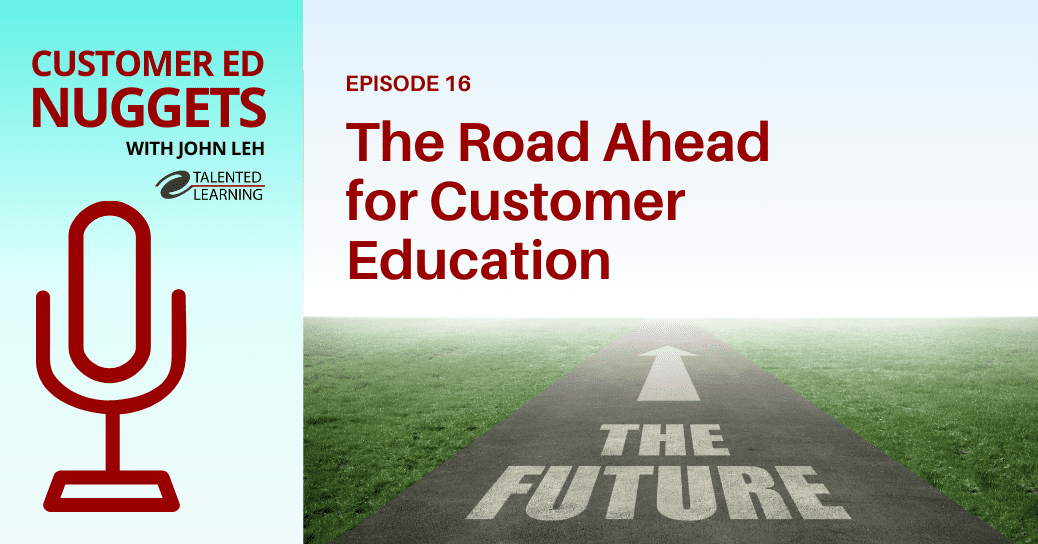

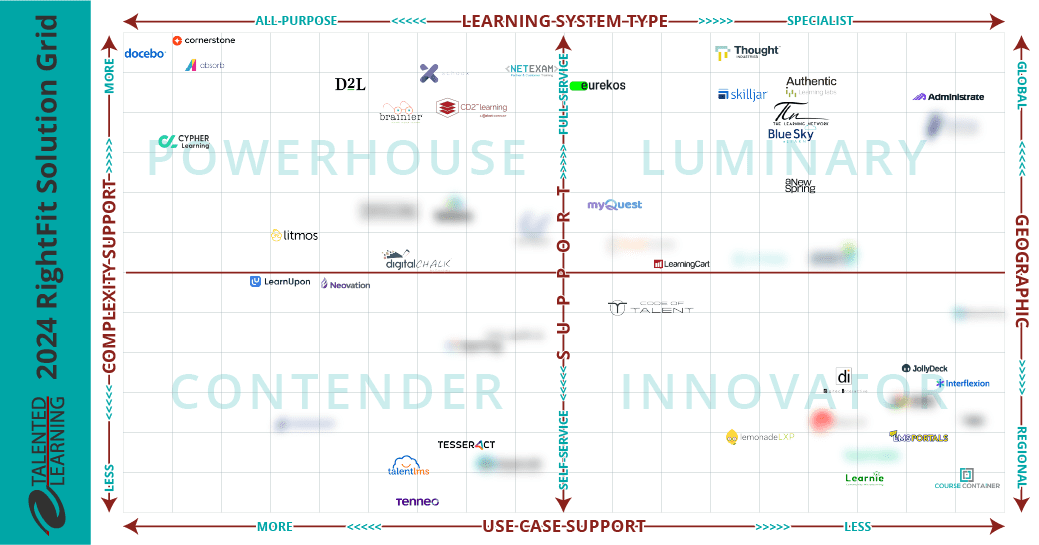


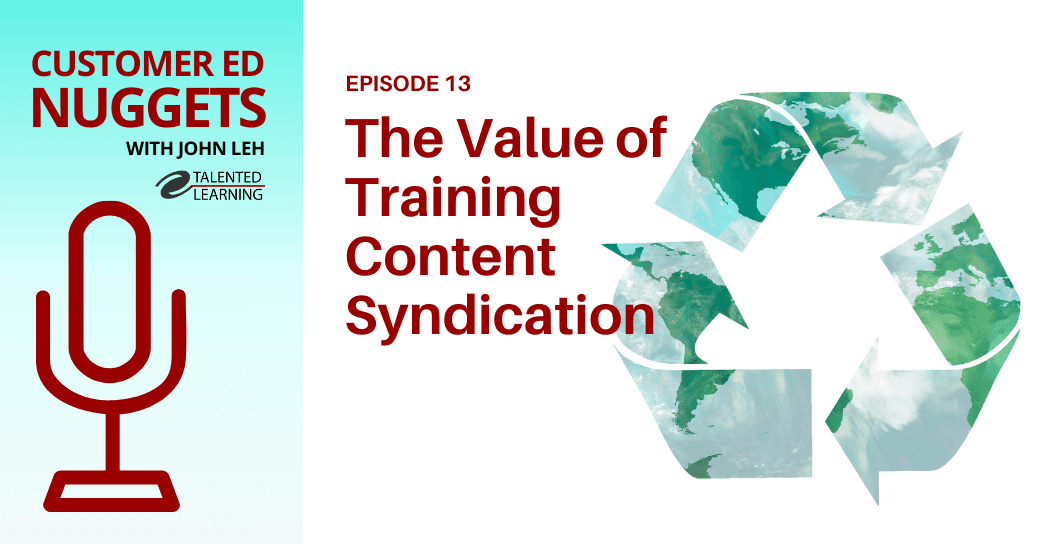


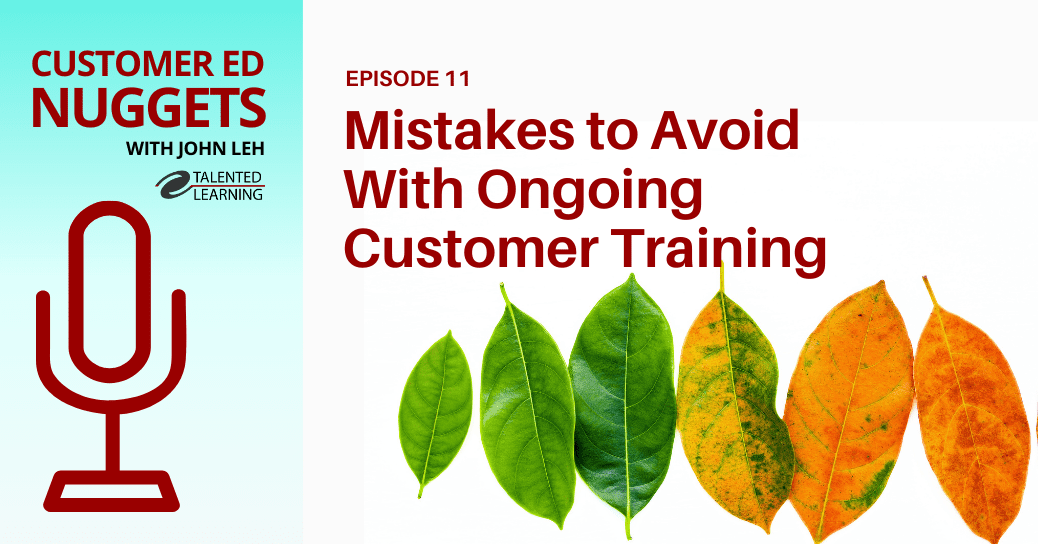




FOLLOW US ON SOCIAL